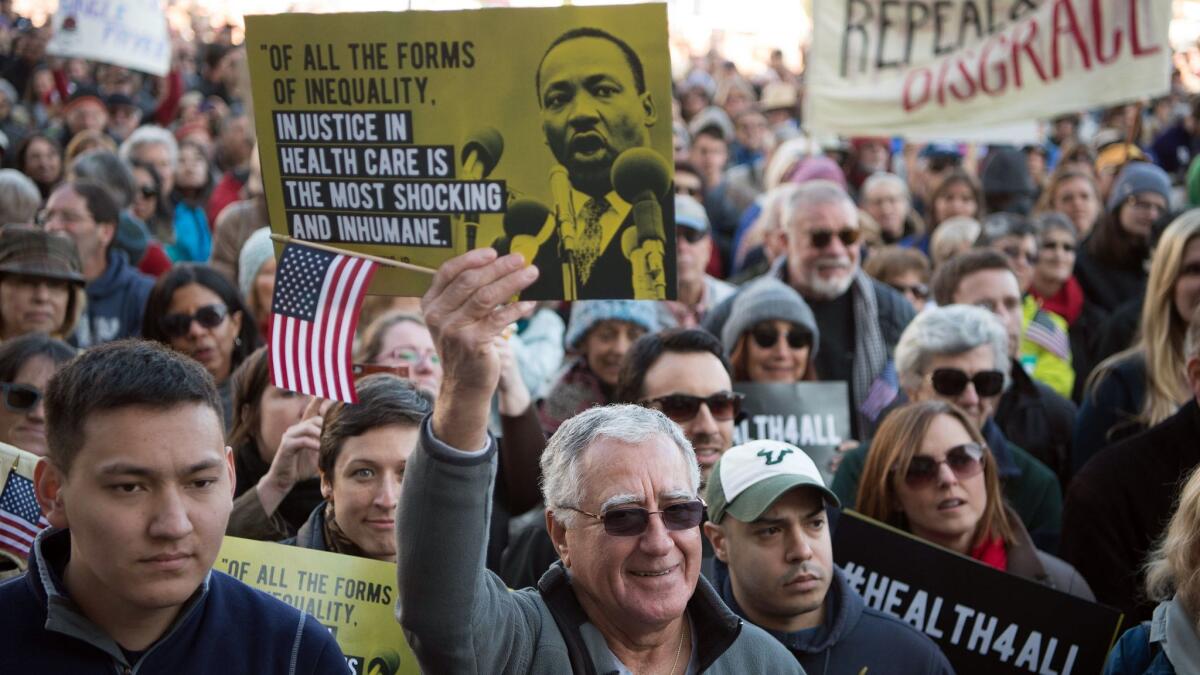Repealing Obamacare without replacement would hike premiums 20% and leave 18 million uninsured, report says

Reporting from Washington — Repealing Obamacare without a replacement would result in higher costs for consumers and fewer people with insurance coverage, according to a report Tuesday from the nonpartisan Congressional Budget Office.
In the first year, insurance premiums would jump by 20% to 25% for individual policies purchased directly or through the Obamacare marketplace, according to the report. The number of people who are uninsured would increase by 18 million.
Those numbers would only increase in subsequent years. Premium prices would continue to climb by 50% the next year, with the uninsured swelling to 27 million, as full repeal took effect, the report said.
Americans may be beginning to worry about such costs. For the first time, more Americans view the Affordable Care Act as a “good idea,” rather than a bad one, according to a new Wall Street Journal/NBC News poll also released Tuesday.
The one-two punch at efforts to dismantle Obamacare comes as President-elect Donald Trump has vowed to replace the healthcare law with a new plan that he has not yet detailed.
Demonstrators rallied across the country over the weekend to save the law that now benefits 20 million Americans.
“Republicans need to wake up to the brutal impact that repealing the ACA will have on the lives of their constituents,” said Rep. Nancy Pelosi (D-San Francisco), the minority leader. “While President-elect Trump promises ‘insurance for everybody,’ Republicans are moving to destroy the health coverage of tens of millions of Americans and drive up costs for millions more. The GOP plan isn’t repeal and delay, or repeal and replace — it’s cut and run.”
Republicans argued Tuesday that the Congressional Budget Office report was based only on their initial plans to repeal Obamacare, but not on their ideas for replacing it, which have yet to be formally proposed.
“Today’s report shows only part of the equation — a repeal of Obamacare without any transitional policies or reforms to address costs and empower patients,” said Sen. Orrin Hatch (R-Utah), the chairman of the Finance Committee. “Republicans support repealing Obamacare and implementing step-by-step reforms so that Americans have access to affordable healthcare.”
But Americans are increasingly skeptical that Republicans will be able to put forward legislation to improve Obamacare.
About 50% of those polled said they had “very little confidence” or “no confidence at all” that Republicans would have a bill, according to the Wall Street Journal.
Even though the Republican-led Congress approved a process last week to begin repealing Obamacare, they have yet to propose a replacement.
At the same time, 45% now think the healthcare law is a “good idea,” a high-water mark since pollsters started asking about it in 2009, when 41% said it was a “bad idea,” the survey said.
Tuesday’s report from the Congressional Budget Office and the congressional Joint Committee on Taxation was based on a 2015 Republican repeal bill that is the framework for this year’s effort.
Under that plan, Republicans would end mandates that most Americans purchase insurance. Later it would eliminate the federal subsidies that help people buy insurance and roll back funding for Medicaid, which was expanded in many states under Obamacare to cover more low-income people.
Republicans have argued that no one should be forced to buy healthcare. But as younger, healthier people drop out, those opting to keep their coverage would likely be sicker, sending prices higher, experts say. As federal funding for subsidies and Medicaid is cut, fewer people will likely be able to purchase insurance or access state healthcare programs.
The Congressional Budget Office estimates current premiums could double by 2026 and that the number of uninsured people would increase to 32 million in 2026.
The insurance markets are already facing challenges under Obamacare, including rising premiums and fewer enrollments than first hoped for, leaving insurers to pull out of some states. At the same time, more Americans now have health insurance than ever before as people buy policies on the marketplaces or enroll in expanded Medicaid offerings in some states.
Trump and Republicans in Congress are now working on alternatives and hope to retain some of Obamacare’s popular provisions — including allowing young adults to remain on their family’s policies and prohibiting insurers from denying coverage for preexisting conditions.
But they have had trouble coalescing around a plan. Trump has said he expects Congress to swiftly repeal and replace Obamacare, and promises to unveil a plan as soon as Rep. Tom Price (R-Ga.), his pick for Health and Human Services secretary, is confirmed and takes office.
Twitter: @LisaMascaro
ALSO:
Despite talk of GOP unity, Trump’s programs face fight from Republican budget hawks
‘Believe me’: People say Trump’s language is affecting political discourse ‘bigly’
Trump’s rise draws white supremacists into political mainstream: ‘I am winning,’ says David Duke
More to Read
Get the L.A. Times Politics newsletter
Deeply reported insights into legislation, politics and policy from Sacramento, Washington and beyond. In your inbox three times per week.
You may occasionally receive promotional content from the Los Angeles Times.











